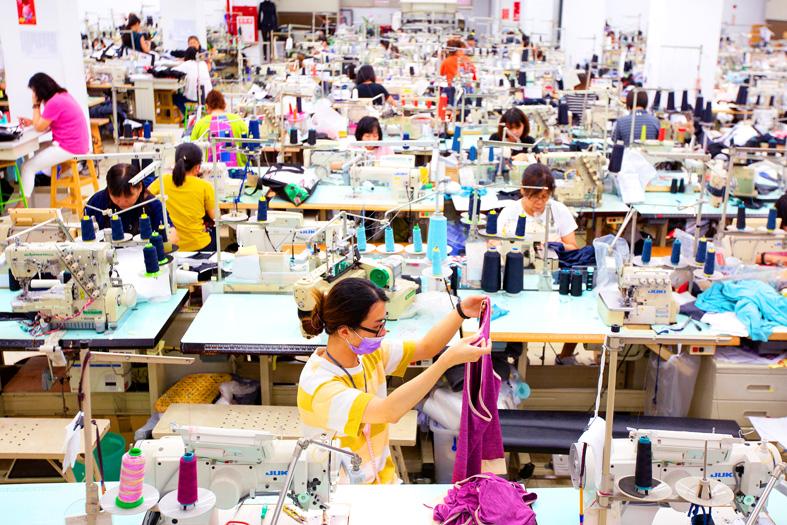Eclat Textile Co (儒鴻) is planning to outsource capacity and arrange overtime for workers to catch up on delayed orders once COVID-19 restrictions in Vietnam have been eased and its plants in the country can resume normal operations, analysts said last week.
The restrictions, which are to remain in place until the end of this month, are likely to affect Eclat’s garment sales by NT$1 billion to NT$1.2 billion (US$35.89 million to US$43.07 million), and fabric sales by NT$130 million to NT$150 million, analysts said after Eclat’s annual general meeting on Thursday.
“Earnings in the third quarter will likely be dragged by a pandemic resurgence in southern Vietnam, with production disruptions being a near-term risk,” Yuanta Securities Investment Consulting Co (元大投顧) said in a note.

Photo: Ashley Pon, Bloomberg
Vietnam is an important production base for Eclat, with up to 80 percent of the company’s garment capacity and 30 percent of its fabrics capacity in the country.
The company also has operations in Taiwan and Cambodia.
Amid Vietnam’s worst COVID-19 outbreak since the pandemic began in late 2019, Eclat in the middle of last month partially halted its operations in Dong Nai and Ba Ria-Vung Tau provinces, Eclat said in regulatory filings.
The company told shareholders that it has asked clients about rearranging orders and would add working shifts and increase outsourcing to compensate for clients’ shipment demands, which are expected to boost its revenue in the fourth quarter.
“Clients will mostly accept delayed shipments rather than transferring orders, given that the pandemic is a risk for everyone,” Yuanta said. “In addition, high entry barriers for production of Eclat’s functional sportswear and fabrics make it difficult for clients to transfer orders in the near term.”
Capital Investment Management Corp (群益投顧) agreed.
“There is a strong end-market demand for apparel,” Capital said in a note. “The Vietnamese plants’ lower output is temporary.”
Eclat’s revenue increased 26.75 percent year-on-year to NT$3.46 billion last month, with cumulative revenue for the first seven months of this year rising 51.11 percent year-on-year to NT$21.47 billion.
Net profit for the second quarter expanded 115 percent year-on-year to NT$1.53 billion.
Earnings per share were NT$5.56.
However, gross margin fell to 27.91 percent, from 28.64 percent in the April-to-June period.
In the first two quarters, net profit doubled to NT$2.88 billion from a year earlier, while earnings per share were NT$10.51 and gross margin was 28.24 percent, Eclat said in a financial statement on Aug. 5.
The company told shareholders that it remains positive about its order outlook for the end of this year and next year, but said that the New Taiwan dollar’s appreciation against the US dollar, as well as higher raw material and shipping costs, would weigh on its margin.
“We expect third-quarter revenue of NT$8.89 billion, up 20.6 percent year-on-year, but with higher shipping fees and rising pandemic prevention costs, we revise down gross margin to 27.9 percent for the third quarter, from the 29.8 percent we previously estimated, and forecast earnings per share of NT$4.90,” Jih Sun Securities Investment Consulting Co (日盛投顧) said in a note.

Taiwanese suppliers to Taiwan Semiconductor Manufacturing Co. (TSMC, 台積電) are expected to follow the contract chipmaker’s step to invest in the US, but their relocation may be seven to eight years away, Minister of Economic Affairs J.W. Kuo (郭智輝) said yesterday. When asked by opposition Chinese Nationalist Party (KMT) Legislator Niu Hsu-ting (牛煦庭) in the legislature about growing concerns that TSMC’s huge investments in the US will prompt its suppliers to follow suit, Kuo said based on the chipmaker’s current limited production volume, it is unlikely to lead its supply chain to go there for now. “Unless TSMC completes its planned six

Power supply and electronic components maker Delta Electronics Inc (台達電) yesterday said second-quarter revenue is expected to surpass the first quarter, which rose 30 percent year-on-year to NT$118.92 billion (US$3.71 billion). Revenue this quarter is likely to grow, as US clients have front-loaded orders ahead of US President Donald Trump’s planned tariffs on Taiwanese goods, Delta chairman Ping Cheng (鄭平) said at an earnings conference in Taipei, referring to the 90-day pause in tariff implementation Trump announced on April 9. While situations in the third and fourth quarters remain unclear, “We will not halt our long-term deployments and do not plan to

‘SHORT TERM’: The local currency would likely remain strong in the near term, driven by anticipated US trade pressure, capital inflows and expectations of a US Fed rate cut The US dollar is expected to fall below NT$30 in the near term, as traders anticipate increased pressure from Washington for Taiwan to allow the New Taiwan dollar to appreciate, Cathay United Bank (國泰世華銀行) chief economist Lin Chi-chao (林啟超) said. Following a sharp drop in the greenback against the NT dollar on Friday, Lin told the Central News Agency that the local currency is likely to remain strong in the short term, driven in part by market psychology surrounding anticipated US policy pressure. On Friday, the US dollar fell NT$0.953, or 3.07 percent, closing at NT$31.064 — its lowest level since Jan.

The New Taiwan dollar and Taiwanese stocks surged on signs that trade tensions between the world’s top two economies might start easing and as US tech earnings boosted the outlook of the nation’s semiconductor exports. The NT dollar strengthened as much as 3.8 percent versus the US dollar to 30.815, the biggest intraday gain since January 2011, closing at NT$31.064. The benchmark TAIEX jumped 2.73 percent to outperform the region’s equity gauges. Outlook for global trade improved after China said it is assessing possible trade talks with the US, providing a boost for the nation’s currency and shares. As the NT dollar